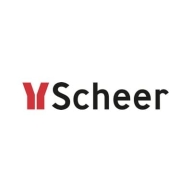


UiPath Platform and Scheer RPA compete in the RPA market for automating repetitive tasks. UiPath appears to have an advantage due to its broader features and integration capabilities, though Scheer RPA shines with its customization and enterprise-grade features.
Features: UiPath Platform offers flexible automation capabilities, an extensive library of integrations, and AI integration. Scheer RPA provides customizable automation solutions suitable for specific industries with strong workflow management tools. Compared to Scheer RPA, UiPath is more adaptable for diverse use cases.
Ease of Deployment and Customer Service: UiPath provides a quick and cloud-friendly deployment process, complemented by extensive community forums and resources. Scheer RPA stands out with robust on-premise deployment options and personalized support services.
Pricing and ROI: UiPath Platform has a higher initial setup cost with substantial ROI through scalability and performance. Scheer RPA offers a competitive pricing strategy with lower upfront costs, appealing to businesses seeking cost-effective solutions. Despite higher costs, UiPath's scalability may offer better value in extensive automation environments, while Scheer RPA is suited for budget-conscious organizations seeking immediate returns and tailored solutions.
| Product | Market Share (%) |
|---|---|
| UiPath Platform | 12.9% |
| Fortra's Automate | 2.7% |
| Scheer RPA | 0.5% |
| Other | 83.9% |

| Company Size | Count |
|---|---|
| Small Business | 25 |
| Midsize Enterprise | 10 |
| Large Enterprise | 9 |
| Company Size | Count |
|---|---|
| Small Business | 249 |
| Midsize Enterprise | 143 |
| Large Enterprise | 665 |
Fortra's Automate offers a user-friendly platform for task automation, featuring a drag-and-drop interface that aids in scheduling, file management, and integrating with services like Azure and AWS.
Fortra's Automate provides substantial ease in automating complex tasks through its intuitive design. It offers seamless integration capabilities, especially with Azure and AWS, and comes equipped with strong error handling. Cost-effective and requiring minimal coding, it supports a broad range of industries by effectively automating tasks such as HR operations, invoice management, and data processing across servers.
What features stand out in Fortra's Automate?
What benefits should users consider in reviews?
In industries such as healthcare and transportation, Fortra's Automate facilitates the automation of client management, HR operations, and data processing, boosting efficiency. Banks utilize it for managing extensive invoice workflows, while distribution sectors rely on its capabilities for insurance checks and system support. Its applicability across servers makes it a valuable tool for any sector seeking to reduce manual workload and improve task accuracy.
The Evolution of Business Process Management Behind Robotic Process Automation, there is hidden a new approach to process automation. RPA will enable companies to automate the execution of routine processes thereby allowing the use of available resources for processes that add value.
UiPath Platform is appreciated for its user-friendly interface and extensive automation capabilities, offering seamless integration with diverse applications. Its intuitive drag-and-drop functionality enables users to design efficient workflows with minimal technical expertise.
UiPath Platform delivers a robust set of features that enhance automation and productivity. With components like Orchestrator, task management is optimized, facilitating better scalability. Users benefit from advanced AI and document understanding tools, boosting data handling accuracy and reducing errors. Despite its strengths, UiPath faces challenges with upgrading processes, AI enhancements, and user documentation. Integration and selector sensitivity issues, along with support and licensing complexities, highlight areas for potential improvement. Users request smoother deployment, error handling, and migration processes. Enhanced support for RHEL/Ubuntu, LINQ, and Lambda and improved real-time insights, automation recording, and scheduling are desired. Streamlining the experience for non-technical users with simplified workflows remains a priority.
What are the key features of UiPath Platform?
What benefits should users look for in reviews?
UiPath Platform is widely implemented across sectors such as finance, healthcare, insurance, HR, IT, and supply chain to automate repetitive business tasks. Common uses include automating data entry, invoice processing, document management, report generation, and customer service operations. Organizations value the platform's ability to integrate seamlessly with systems like SAP, CRM, and Oracle, allowing for enhanced efficiency and accuracy in processing both structured and unstructured data.
We monitor all Robotic Process Automation (RPA) reviews to prevent fraudulent reviews and keep review quality high. We do not post reviews by company employees or direct competitors. We validate each review for authenticity via cross-reference with LinkedIn, and personal follow-up with the reviewer when necessary.